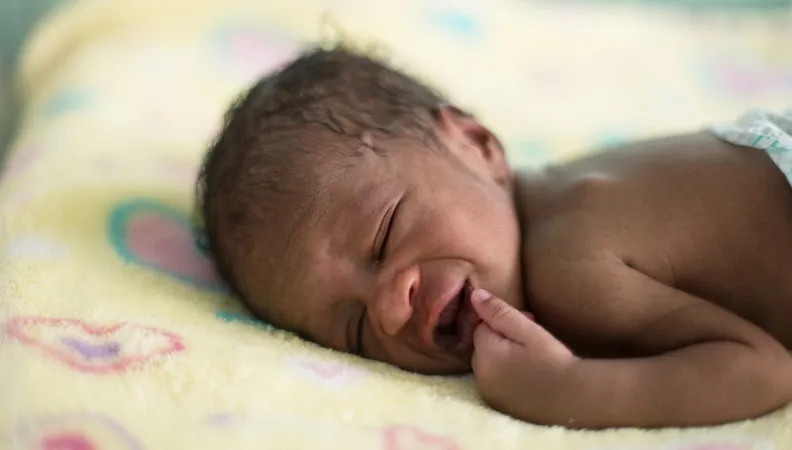Share the page
Made in Cameroon: Specially Designed Incubators for premature babies
Published on

In our series on “Shared Innovation”, AFD highlights innovative programs devised and developed in our partner countries.
At his "fablab" or fabrication laboratory called “AUI-Techno,” Serge Armel Njidjou has designed neonatal incubators specifically for his native Cameroon, where power outages can put foreign-built incubators out of commission. Using solar energy for back-up power and other innovations, Njidjou has become a torchbearer in the fight against premature infant mortality. In this interview, he tells us about an award-winning project that could help hundreds of thousands of families across the continent.
You have switched from being a recognized academic in digital technology to the head of a fablab. How did you come to create AUI-Techno?
Serge Armel Njidjou: The gestation period for this idea was very long. I spent my whole career at the University of Dschang, in western Cameroon, in digital technology, and I was head of the Industry Interface Center at the same time. I’ve always had a passion for entrepreneurship. At my university, I helped in developing incubation facilities for several projects.
It was very interesting, but I remained frustrated by the inertia of the academic world and especially by its administrative red tape, which slowed down the development and marketing of innovative initiatives. The ideas were there, but they were not leading to anything concrete.
Further Reading: “Shared innovation”, the series
That’s why I finally decided to start up my own fab lab, AUI-Techno, at the end of 2015. I was determined to gather the top talents to work with me and to support meaningful projects that would be 100% Made in Cameroon, from design to marketing.
Did the idea for interactive neonatal incubators come from the more creative intellectual spirit of the fab lab?
Yes, exactly. The incubator was initially just one idea among many. But at the Seminar for Excellence in Scientific Research in 2018, our first prototype was awarded the Head of State’s Special Prize. That’s when something clicked. We then decided to focus on that particular project.
It’s a project that meets a real need in Cameroon.
The figures speak for themselves: Cameroon has only 100 neonatal incubators for several thousand health facilities. It’s estimated that about 15,000 premature infant deaths could be avoided each year if the Cameroonian health system had suitable equipment. Another problem is that all those incubators are imported, mostly from Europe and Asia, and we don’t have on-site technicians with the proper skills to make sure they work properly.
They aren’t adapted to local constraints at all. A single power outage can trigger a breakdown. That’s why the entire healthcare system is tending to give up using those incubators, which are already few in number. You can imagine the tragic consequences for premature babies. So, we studied the demands of health workers, in order to design a product that matches local needs.
What’s special about the incubator?
Its foremost advantage is its energy resilience. If there’s a power cut, or even simply no electricity supply—which is the case in some areas of the country—our incubators can operate on solar energy.
Another distinctive feature is its interactivity. Because there’s a big shortage of well-trained pediatric personnel in Cameroon, we’ve ensured that the incubators are as interactive as possible. This way, pediatricians are able to study infant health indicators remotely with their smartphone, while treating other young patients at the same time.
See also: AFD Digital Challenge: celebrating 5 innovations that support African women
The incubators also have an integrated phototherapy system. Finally, in the event of breakdown, our team of technicians automatically receives an alert and can take quick action to repair the equipment.
How many neonatal incubators does Cameroon have now?
Still too few, unfortunately. The main reason has been the long approval process, as there had been no certification body in Cameroon for this type of high-tech equipment. But that has changed since December 2019. We’ve worked with the Ministry of Health to develop a very far-reaching program to supply the country with 500 of our neonatal incubators within three to four years.
Unfortunately, discussions were interrupted by the Covid-19 crisis, which put all health policies dedicated to maternal and child health on hold. We’re hoping discussions will resume soon.
Despite that, several of our incubators are already being used in a referral facility, the Bafoussam Regional Hospital. Our long-term goal is to distribute our product throughout the entire network of Cameroonian hospitals, both public and private.
Can your incubators also be used on a broader scale?
Yes. The needs in this area are not limited to Cameroon. We estimate there’s a shortage of about 100,000 incubators in West and Central Africa alone. We’ve started up approval procedures in Burkina Faso, and we’re also in discussions with the Beninese Pediatric Society. Our aim is to meet a very large-scale demand.
